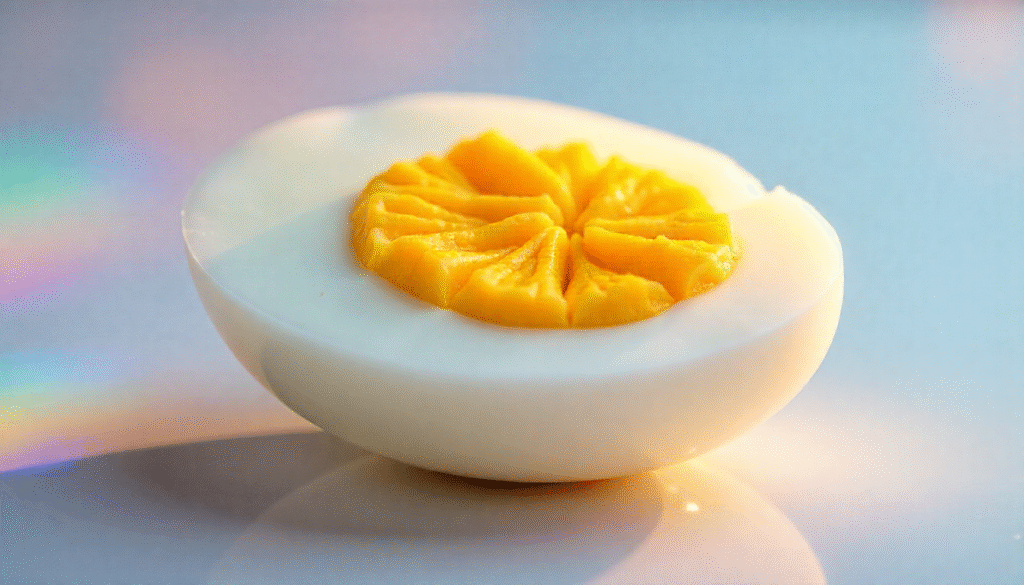Introduction: The Power of a Simple Boiled Egg
A hard-boiled egg might seem like a humble snack, but beneath its smooth shell lies a rich supply of nutrients your body needs daily. Packed with high-quality protein, essential vitamins, and important minerals, boiled eggs are one of the most nutrient-dense foods on the planet. Whether you’re aiming for weight management, muscle growth, or overall wellness, understanding the egg nutrition facts can help you make better dietary choices.

Egg Nutrition Facts: A Complete Overview
Before we dive deeper, here’s a quick nutritional snapshot for one large hard-boiled egg:
| Nutrient | Amount per Large Boiled Egg |
|---|---|
| Calories | ~77 kcal |
| Protein | 6.3 g |
| Fat | 5.3 g |
| Carbohydrates | 0.6 g |
| Cholesterol | 186 mg |
| Vitamin A | 6% DV |
| Vitamin B12 | 9% DV |
| Vitamin D | 5% DV |
| Choline | 147 mg |
| Selenium | 22% DV |
These numbers make it clear why eggs are considered a nutritional powerhouse.

Calories in Egg Boiled – Low in Calories, High in Nutrition
A large boiled egg contains about 77 calories. For most people, this makes it an excellent low-calorie, high-protein snack. If you’re tracking your intake for weight loss, you’ll appreciate that eggs deliver maximum nutrients for minimal calories.
Pro tip: Compare egg calories boiled vs fried. Frying adds extra fat and calories from oil, while boiling keeps the count lower.
Protein Content of Eggs – Why It Matters
Eggs are a complete protein source, meaning they contain all nine essential amino acids.
- 1 egg calories come primarily from protein and fat.
- Egg protein per egg: Around 6.3 grams per large egg.
- The egg white protein benefits include muscle repair, satiety, and immune support.
Athletes and gym-goers often rely on boiled eggs for post-workout recovery.

Are Eggs Carbs or Protein?
Nutritionally speaking, eggs are protein- and fat-rich, with only 0.6 grams of carbohydrates per large boiled egg. This makes them a perfect choice for low-carb, ketogenic, and diabetic-friendly diets.
Egg White Nutrition vs. Yolk Nutrients
Egg white nutrition:
- Low in calories and fat
- High in protein
- Virtually carb-free
Yolk nutrients:
- Rich in vitamins A, D, E, and K
- Contains choline for brain health
- Source of omega-3 fatty acids and antioxidants like lutein and zeaxanthin
Egg Vitamins and Minerals – More Than Just Protein
Boiled eggs are a nutritional powerhouse, offering a wide array of essential micronutrients that are vital for maintaining optimal health. These micronutrients, while only required by the body in relatively small amounts, are absolutely indispensable for the proper functioning of a vast range of bodily processes.
From supporting immune function to aiding in energy production and contributing to healthy cell growth, these micronutrients are true workhorses. Incorporating boiled eggs into your diet is a fantastic and efficient way to ensure that you are consistently receiving a concentrated and easily accessible source of these crucial vital components.
This regular intake of micronutrients is a cornerstone of supporting overall health and well-being, helping to keep your body functioning at its best. Furthermore, boiled eggs stand out as a convenient and readily available source, making it simple to integrate these important micronutrients into your daily nutritional routine, regardless of your lifestyle or schedule.
Key Vitamins and Minerals in Hard-Boiled Eggs
Hard-boiled eggs are well-known for being a fantastic source of protein, but their nutritional benefits extend far beyond that single macronutrient. In reality, hard-boiled eggs are a nutritional powerhouse, containing a wide array of essential vitamins and minerals.
These nutrients play a vital role in supporting numerous facets of our overall health and well-being. To truly appreciate the value of incorporating hard-boiled eggs into your diet, it’s helpful to take a more detailed look at some of the most significant nutrients that they offer.
By examining these key components, we can gain a deeper understanding of why eggs are considered such a beneficial food. Let’s delve into the specific vitamins and minerals present in eggs and explore the reasons why they are so important for maintaining optimal health.
This closer examination will highlight the multifaceted nutritional profile of hard-boiled eggs and reinforce their position as a valuable addition to a balanced diet.

Vitamin A — Supports Vision and Immunity
One large boiled egg contains a good amount of Vitamin A, which is critical for maintaining eye health and night vision. This nutrient helps prevent age-related vision issues such as macular degeneration. It also plays a vital role in strengthening the immune system, helping your body fight infections more effectively. For people who spend long hours on screens or have diets low in leafy greens, eggs can be an easy way to boost vitamin A intake naturally.
Vitamin D — Helps Calcium Absorption for Bone Health
Eggs are one of the few natural food sources of Vitamin D, a nutrient often called the “sunshine vitamin.” Vitamin D helps your body absorb calcium efficiently, making it essential for bone health, strong teeth, and reducing the risk of osteoporosis. For individuals who get limited sun exposure, regularly eating boiled eggs can help maintain healthy vitamin D levels, supporting both skeletal and immune function.
Vitamin B12 — Essential for Red Blood Cell Formation and Nerve Health
Vitamin B12 in eggs supports the production of red blood cells, which carry oxygen throughout the body. A deficiency can lead to anemia, fatigue, and weakness. This vitamin also plays an important role in maintaining nerve health and proper brain function. For vegetarians who include eggs in their diet, boiled eggs can be a crucial source of vitamin B12, since plant-based foods naturally contain very little of it.
Choline — Crucial for Brain Development and Liver Function
Egg yolks are one of the best dietary sources of Choline, a nutrient essential for brain development, memory, and cognitive function. It supports the structure of cell membranes and assists in the production of neurotransmitters that regulate mood and mental performance. Choline is also important for liver health, helping to process fats and prevent abnormal fat accumulation. Pregnant women and breastfeeding mothers are often encouraged to get enough choline, as it supports fetal brain development.
Selenium – An Antioxidant that Fights Oxidative Stress
Boiled eggs provide a significant amount of Selenium, a powerful antioxidant that protects your cells from damage caused by oxidative stress. It also plays a key role in supporting the immune system and thyroid function. Adequate selenium intake has been linked to reduced inflammation and improved defense against certain chronic diseases. Since selenium is not abundant in many diets, eggs can be an easy, affordable source.

Boiled Egg Benefits – Why You Should Include Them in Your Diet
- Weight Management — High protein keeps you fuller for longer.
- Muscle Growth — Protein supports muscle synthesis.
- Brain Health — Choline boosts cognitive function.
- Eye Protection — Lutein and zeaxanthin help prevent macular degeneration.
- Heart Health — Balanced intake may improve cholesterol ratios.
Cholesterol in Eggs Explained
A large egg contains 186 mg of cholesterol, all in the yolk. While older advice suggested limiting eggs, new research shows moderate consumption is safe for most people and can be part of a heart-healthy diet.
How Many Carbs in an Egg?
One large boiled egg has less than 1 gram of carbs. That’s why eggs are a go-to protein for low-carb and ketogenic diets.
Best Ways to Cook Eggs for Nutrition
- Boiling — Preserves nutrients without adding fat.
- Poaching — Similar benefits to boiling.
- Steaming — Gentle cooking, nutrient retention.
Avoid overcooking to maintain vitamin integrity.
FAQs (People Also Ask)
Q: How much protein in 2 boiled eggs?
A: Two large hard-boiled eggs contain around 12.6 grams of protein in total — about 6.3 grams per egg. This protein is considered “complete,” meaning it contains all nine essential amino acids your body cannot produce on its own. For athletes, gym-goers, or anyone recovering from illness, this makes boiled eggs an excellent, convenient protein source. The egg white nutrition provides the bulk of this protein with very little fat, while the yolk adds healthy fats, vitamins, and minerals.
Q: Are boiled eggs good for weight loss?
A: Yes, boiled eggs are highly beneficial for weight loss. They are low in calories (~77 calories per large egg), high in protein, and contain virtually no carbs (less than 1 gram per egg). Protein-rich foods like boiled eggs increase satiety hormones, help you feel fuller for longer, and reduce snacking between meals. Their nutrient density also means you’re getting essential vitamins (A, D, B12) and minerals (selenium, choline) without consuming excess calories. Many low-carb and ketogenic diets use boiled eggs as a staple for this reason.
Q: How many calories in a boiled egg without yolk?
A: A boiled egg without its yolk — essentially just the egg white — has about 17 calories, nearly all from protein. Removing the yolk also eliminates most of the egg’s fat and cholesterol content. This can be beneficial for individuals on very low-fat diets or those aiming to reduce cholesterol intake. However, the yolk is where most of the egg’s vitamins, minerals, and antioxidants (like lutein and zeaxanthin) are found, so eliminating it means losing out on some important nutrients.
Q: How many carbs in a boiled egg?
A: A large boiled egg contains less than 1 gram of carbohydrates, making it an excellent choice for low-carb, keto, and diabetic-friendly diets. The low carbohydrate content, combined with its high protein and healthy fat profile, means boiled eggs won’t cause blood sugar spikes and can help maintain steady energy levels throughout the day. This makes them a smart snack or meal addition for people managing insulin resistance or following carb-restricted meal plans.
Final Thoughts
The nutritive value of egg is hard to match — they are nutrient-dense, affordable, and versatile. Whether you enjoy them as a quick snack or part of a meal, boiled eggs offer a balanced mix of protein, vitamins, and minerals.
If you’re looking for healthy, protein-rich, low-carb options, hard-boiled eggs deserve a regular spot in your diet.
Call-to-Action
Enjoyed this guide? Share it with friends and check out our Healthy Breakfast Ideas and Protein-Rich Foods Guide for more ways to boost your nutrition.
If you want, I can now add FAQ schema and a fully interlinked internal linking strategy so this article is Google Discover and Featured Snippet ready.
Do you want me to prepare the schema markup + internal link anchors next? That will complete the SEO package for you.



